Tehran says direct talks with US don’t work for Iran
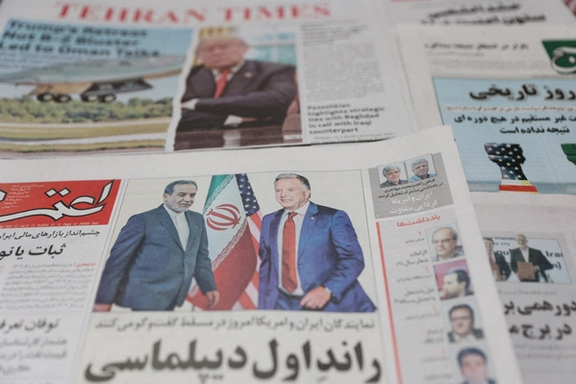
Iran’s foreign ministry spokesperson said that US-Iran negotiations are indirect because direct talks would not be effective or beneficial for the Islamic Republic.

Iran’s foreign ministry spokesperson said that US-Iran negotiations are indirect because direct talks would not be effective or beneficial for the Islamic Republic.
Esmail Baghaei said that indirect negotiations are not unusual and have occurred before, adding that they are currently taking place in other contexts as well.
“Direct negotiations, in a situation where one side insists on a coercive approach, uses threats, and resorts to force, are neither beneficial nor acceptable to a side like the Islamic Republic of Iran,” he said speaking to reporters on Monday. “Therefore, we will continue with the form and approach we have chosen.”
Baghaei also said that the next round of talks may take place in a location other than Oman, adding that the location is not as important as ensuring the framework of interaction between Iran and the US remains unchanged.
On Sunday, Axios reported that Rome will host second round of Iran-US negotiations next week.
Baghaei added that the Iran's main demand in the negotiations is the removal of sanctions, which the Islamic Republic is pursuing with determination.
Baghaei also confirmed that the Director General of the UN's nuclear watchdog Rafael Grossi will likely visit Tehran this week. Earlier the Wall Street Journal reported that Grossi will visit Tehran this week ahead of the next round of US-Iran talks on Saturday.
He also addressed Tehran's economic cooperation with Washington, saying: "The Islamic Republic has never placed any obstacles to economic cooperation with other parties, but the real problem lies with the US, which, through complex laws, has deprived its own citizens of any economic dealings with Iran."
Baghaei confirmed that Foreign Minister Abbas Araghchi will travel to Moscow later this week for a pre-planned visit.
"The trip was planned in advance, but there will be consultations regarding the talks with the US," Baghaei said.
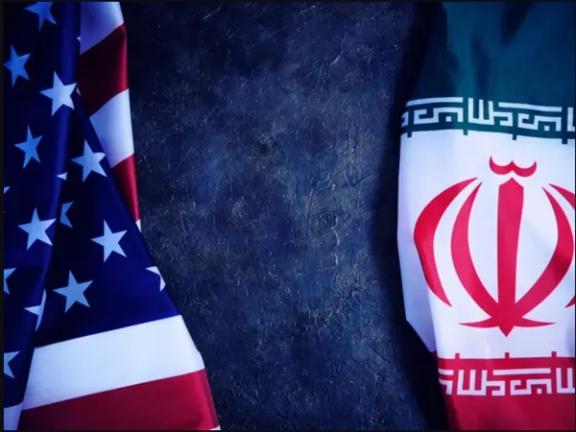
The first thing Iranian Foreign Minister Abbas Araghchi probably noticed upon returning to Tehran from Oman—where he met with US Special Envoy Steve Wikoff—was the appearance of his own oversized images on billboards across the capital’s expressways.
Hardliners in Tehran have been working to frame the opaque, closed-door meeting—described as positive by both sides—as a political win for the Islamic Republic. Some have even gone so far as to label it a victory.
The following day, Javan, the IRGC-affiliated daily, declared: "Iran is the winner of the negotiations, with or without an agreement." The paper described the meeting as "a show of Iran's power against the United States' helplessness."
Javan highlighted the breaking of the deadlock and the promise of further negotiations as signs the process would ultimately benefit Iran. It claimed Iran had dictated "all of its preconditions, including the venue, timing, and agenda" to the United States.
This triumphant narrative, however, stood in contrast to Araghchi’s own statement that the talks focused solely on nuclear issues. Meanwhile, Reuters reported that the negotiations aimed to "de-escalate regional tensions, facilitate prisoner exchanges, and reach limited agreements to ease sanctions in exchange for controlling Iran's nuclear program."
At the same time, some hardliners sought to emphasize Supreme Leader Ali Khamenei’s authority by noting that he had personally authorized the meeting.
However some opposition to negotiations was evident among ultra-hardliners. They appeared to highlight Khamenei's role with the possible intent of assigning blame to him should the renewed diplomatic engagement fail.
Hossein Shariatmadari, editor of the Khamenei-linked Kayhan newspaper, wrote: "The indirect talks with the United States could not have taken place without Khamenei's permission. If he had not approved them, he would certainly have blocked the meeting."
Shariatmadari added: "The horizon is not clear, and Iran must think of a Plan B." He dismissed US threats of military action as "a bluff," and claimed that "the draft Witkoff handed to Araghchi included no such thing as dismantling Iran's nuclear establishments or the possibility of a military attack."
Outspoken ultra-hardliner lawmaker Hamid Rasaei said in parliament on Sunday morning: "We all know that the Supreme Leader believes that the United States is not trustworthy and that negotiations with Washington are useless." He added, however, that "The Leader has authorized the talks to prove to some Iranian officials that the US breaks its promises and will put forward illogical demands."
Meanwhile, another ultraconservative MP, Mahmood Nabavian, vice-chairman of the Iranian parliament's national security committee, claimed that Trump initially wanted US Secretary of State Marco Rubio to participate in the talks with Araghchi. "But we insisted that Witkoff should go to Oman instead," he said, adding: "Trump accepted all of Iran's conditions regarding the format of the talks."
Saeed Haddadian, a political aide to parliament speaker Mohammad Bagher Ghalibaf, also warned against excessive optimism about the negotiations with Washington. He suggested that Trump might not even support the approach taken by his own special envoy.
"If you show weakness in front of a thug such as Trump," Haddadian said, "you are likely to end up like Ukrainian President Zelensky. You will be humiliated, and you will not get any results."
In a separate development, Mehdi Fazaeli, a member of the Supreme Leader's office staff, denied claims that senior Iranian officials had pressured Khamenei to shift his position in response to Trump’s letter or to adjust his overall approach to the talks.
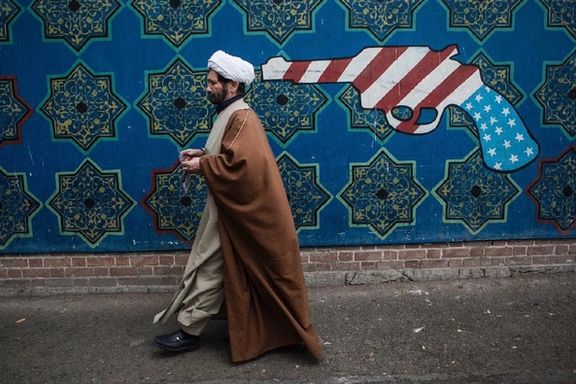
The apparent swift progress of talks between the United States and Tehran has caused some observers to wonder whether Washington's former embassy, the emblem of their original bitter rift, may be reinstated in the event of success.
Early on Sunday, dissident lawyer and civil activist Hassan Younesi posted on X that he had heard “some groups and organizations stationed at the embassy building … have been ordered to evacuate it.” The post quickly drew attention, partly because Younesi’s father, Ali Younesi, served as intelligence minister under reformist President Mohammad Khatami.
Hours later, however, Younesi deleted the post and published a follow-up, saying he had been contacted by what he called “responsible authorities” who denied the reports and said his post had created the mistaken impression that preliminary steps were being taken to prepare the embassy for a handover.
Such deletions by political activists and media figures—often under pressure from security agencies—are not uncommon in Iran.
Some users suggested that a potential handover could pave the way for American investments in Iran, especially after President Masoud Pezeshkian commented recently that Supreme Leader Ali Khamenei had “no objection” to American investors entering the Iranian market.
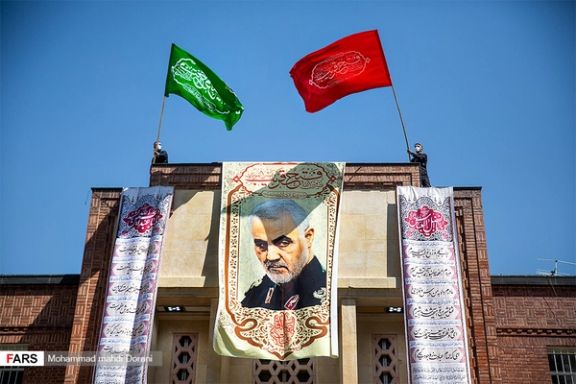
“Why would Trump push for direct talks unless it’s about reopening the embassy?” one user posted. “How else can US companies invest here?”
Former Israeli official and spokesperson Ben Sabeti also weighed in on X: “Iran makes cheap gestures toward @POTUS for the success of negotiations? There are reports about the US Embassy in Tehran being vacated for the first time since 1979. Is the regime also ready to make nuclear concessions?”
Meanwhile, Iranian media—highly constrained by censorship—picked up Younesi’s now-deleted post, but offered minimal commentary. “If true, this is a very meaningful step,” read a brief article titled What’s the story of the evacuation of the US Embassy building? published by Rouydad24 on Sunday. Fararu, another popular online outlet, published a gallery of recent photos showing foreign tourists visiting the former embassy, under the headline US Embassy in Tehran Draws Attention Again on Day of Talks—without offering any further remarks.
The US embassy takeover forty-six years ago
Islamist students occupied the embassy in November 1979. The students held tens of American diplomats and other staff hostage for 444 days. The embassy compound, which the students called “Den of Spies”, however, has been used as a base by IRGC-affiliated groups, including the Basij militia and its affiliated Daneshjoo (Student) News Agency.
Other parts of the building were converted into a museum and opened to the public in recent years. The Swiss embassy has represented US interests in Iran in the past forty-six years.
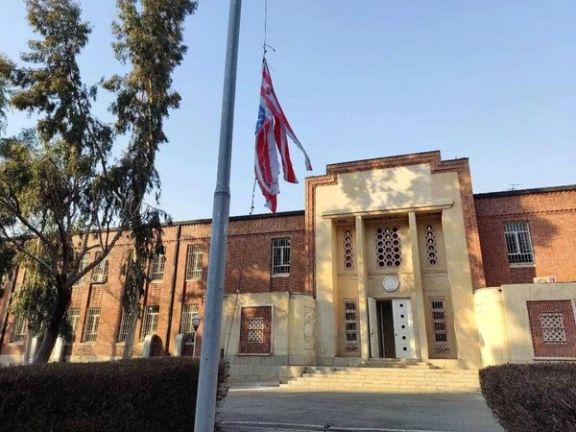
Calls for normalization of relations and re-opening of the embassy
In recent years, various Iranian political and media figures have supported the idea of restoring diplomatic ties with the United States and returning the embassy building after decades of occupation.
Most recently, reformist politician and cleric Mohsen Rohami suggested in an interview published by Khabar Online that Iran and the United States could re-open their embassies and that higher officials than foreign ministers could sit at the negotiation table.
“This will have a positive psychological impact, besides its practical outcome, on our society and neighbors,” Khabar Online on Sunday quoted Rohami, who served as the legal deputy of Pezeshkian’s campaign last year, as saying.
Back in August 2024, Mehdi Ghazanfari, head of the National Development Fund, called for the reestablishment of consular relations with the United States. He controversially blamed the Communist Tudeh Party for provoking the 1979 embassy seizure and urged the Pezeshkian administration to act fast before what he called his political rivals' honeymoon with him ended.
His suggestion was echoed by some other politicians and public figures including Mohammad-Hossein Khoshvaght, a former official of the Islamic Guidance Ministry and managing director of Fararu. Khoshvaght has close ties to Khamenei’s household through the marriage of his sister to Khamenei’s eldest son, Mostafa.
Khoshvaght contended that normalization of relations could benefit both countries. "An Iran that has normal relations with the United States is a nightmare for Russia and Israel; for Putin, an Iran with nuclear weapons is less dangerous than an Iran that has normal relations with the United States!" he wrote on X.
In a 2015 interview with The Guardian, Akbar Hashemi Rafsanjani said reopening the embassy was “not impossible” if both sides changed their behavior. Similarly, in a 2014 interview with Swiss TV during the Davos Forum, President Hassan Rouhani said animosity with the United States could eventually turn into friendship.
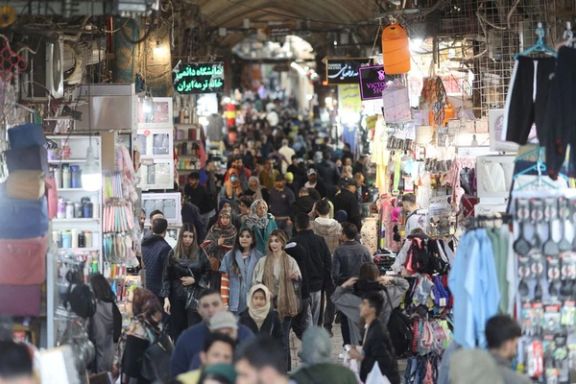
Some Iranians are questioning whether US-Iran talks will alleviate persistent economic hardship and political repression.
The talks took place on Saturday and were led by Iran’s Foreign Minister Abbas Araghchi and Donald Trump’s Middle East envoy Steve Witkoff.
While both sides described the exchange as “positive and constructive,” Iranians interviewed anonymously by Iran International or in the form of messages to its submission service questioned the impact of the discussions on their lives.
“This negotiation won’t lower prices or fix the economy,” said one citizen in a video message showing a small grocery purchase costing over ten million rials (around $11).
“Even if billions are unfrozen, not a single rial will reach the people. It’s all in the name of the people, but for the benefit of the regime,” another added.
Iran's economy has been in crisis since 2018, when Trump exited the JCPOA nuclear deal and imposed heavy sanctions on Iran. Tens of millions subsist at poverty level, with workers making around $120 a month.
Some pointed to systemic mismanagement and repression as the root of Iran’s crises, not international sanctions. They criticized the West for engaging diplomatically with a government they believe is at its weakest.
“Why negotiate when the regime is vulnerable?” asked one voice message. “Why not support the Iranian people and end this nightmare?”
The move toward talks, despite Supreme Leader Ali Khamenei’s longstanding opposition to negotiations with what he has repeatedly called a untrustworthy United States, was seen by some as an act of desperation.
“Khamenei once said Qasem Soleimani’s shoes were worth more than Trump,” said a citizen to Iran International, referring to the IRGC commander killed in 2020 on Trump's orders. “Now he negotiates with the man he called Soleimani’s killer.”
As Trump continues to press for a new deal—recently warning that Iran must comply or face consequences—many Iranians say the clerical rulers have caved to external pressure for the sake of survival.
“They refused American vaccines during COVID, but now they’re ready to shake Trump’s hand to stay in power,” said another.
Several messages also highlighted a growing sense that the only path to change may be confrontation. “We’re even ready for war,” said one citizen. “If that’s what it takes to end this regime.”
Images circulating online captured public sentiment, including a Tehran banner reading: “With or without a deal, this executioner republic will fall by the will of the Iranian people.”
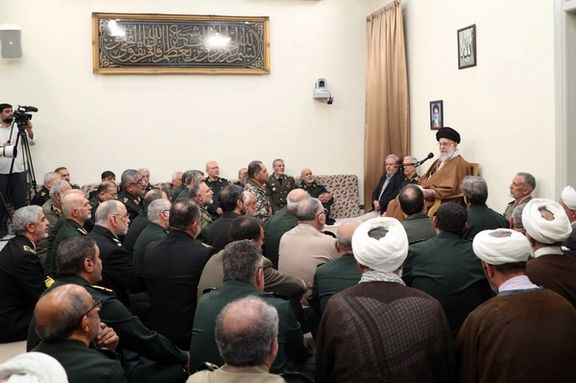
A day after talks between Iranian and American officials in Oman, Supreme Leader Ali Khamenei told military commanders that Iran’s armed forces must maintain maximum readiness to confront hostile pressure.
He addressed commanders in Tehran on Sunday, describing the military as the nation’s shield and saying Iran’s progress had left its enemies frustrated.
“What makes them hostile is not the name of the Islamic Republic, but the resolve of a Muslim and independent nation that refuses to rely on others for its dignity,” Khamenei said.
He called for ongoing upgrades in capacity—including weapons, logistics, and personnel welfare—alongside a parallel emphasis on ideological commitment.
Khamenei told military officers that foreign actors were actively working to undermine belief in the legitimacy of the armed forces’ mission.
“Armies that lack conviction, courage, and trust in their cause have collapsed, no matter how heavily equipped they were,” Khamenei added, accusing Western powers of hypocrisy for opposing Iran’s military development while holding massive arsenals of their own.
He acknowledged economic weaknesses but warned against allowing them to overshadow what he called advances in both physical preparedness and national morale.
Chief of Staff Major General Mohammad Bagheri also echoed the call for readiness, referring to Iran’s weapons production, joint exercises, and cooperation between military branches. He praised Iran’s role in supporting Gaza and Lebanon and said public backing remained strong.
“The armed forces are fully prepared, and the enemy will fail to achieve its goals,” Bagheri said.
The comments follow recent threats by US officials, including president Donald Trump over Iran’s nuclear activities and regional support for proxies.
After Trump’s threats of a military strike, Tehran agreed to indirect talks, despite a previous refusal by Khamenei.
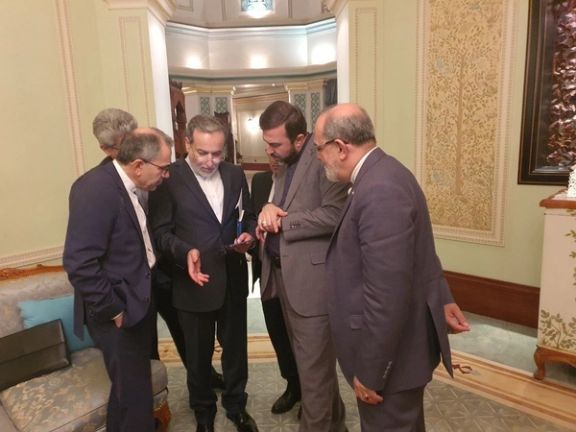
The initial indirect nuclear discussions between Iran and the United States in Muscat established a tone of equality between the two parties, according to Iranian Foreign Minister Abbas Araghchi.
“In my view, for a first session, it was a constructive meeting,” Araghchi said in remarks published by Iranian media after the talks.
“It was conducted in a calm and very respectful environment. No inappropriate language was used, and both parties demonstrated their intent to pursue these negotiations toward an agreement from an equal footing.”
The meeting, facilitated through shuttle diplomacy by Omani Foreign Minister Badr al-Busaidi, lasted about two and a half hours, he added.
Araghchi confirmed that Busaidi moved between the Iranian and American delegations four times to relay messages.
The Iranian official said that Tehran is not interested in drawn-out or symbolic dialogue. “We and the other side both believe in avoiding time-wasting negotiations. The US also indicated that it seeks a fair and timely agreement,” he added.
A second session is expected to be held next Saturday. Araghchi said while Oman will continue to host the process, the physical location may change.
The White House also described the exchange as a rare moment of diplomacy amid longstanding tensions.
US and Iranian officials held “very positive and constructive” talks in Muscat on Saturday, the White House said in a statement.
Special Presidential Envoy Steven Witkoff, accompanied by Ambassador Ana Escrogima, met Iranian Foreign Minister Abbas Araghchi in talks hosted by Oman’s foreign minister.
“Special Envoy Witkoff underscored to Dr. Araghchi that he had instructions from President Trump to resolve our two nations’ differences through dialogue and diplomacy, if that is possible. These issues are very complicated, and Special Envoy Witkoff’s direct communication today was a step forward in achieving a mutually beneficial outcome,” added the statement.